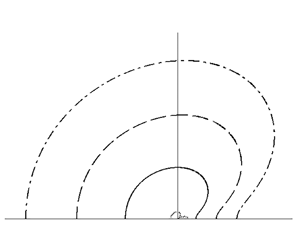Published online by Cambridge University Press: 12 April 2022

By adapting the triple decomposition of an instantaneous turbulent flow into a time-averaged mean field, large-scale coherent motion and fine-scale random fluctuations, and treating the coherent motion as instability modes on the mean flow, a mathematical theory is developed to describe the nonlinear spatial–temporal modulation and acoustic radiation of a coherent structure (CS) on a circular jet in the form of a wavepacket consisting of an axisymmetric (ring) mode and its sideband components. The effect of fine-scale turbulence on the CS is characterised via a gradient closure model, and the non-parallelism due to the axial variation and radial velocity of the mean flow is taken into account. By employing the matched asymptotic expansion and multi-scale techniques, a strongly nonlinear system is derived, which governs the envelope of the CS and its vorticity and temperature in the critical layer. Numerical solutions to the evolution system show that the theory captures the nonlinear amplitude attenuation and vorticity roll-up as observed in experiments. The large-distance asymptotic properties of the CS allow us to describe and predict its acoustic radiation on the basis of first principles. The CS is trapped within the jet, but its self-interaction generates a temporally and axially modulated mean-flow distortion, which acts as the emitter to radiate low-frequency sound waves, with the Reynolds stresses driving this mean-flow distortion being identified unambiguously to be the physical source in the present context. An equivalent source in the Lighthill type of acoustic analogy is also identified. For the present ring-mode CS in the fully developed region of a circular jet, the equivalent source can be determined before the acoustic field is, and the intensity of the radiated sound waves is found to be  $O(\epsilon ^3)$, where
$O(\epsilon ^3)$, where  $\epsilon$ measures the magnitude of the CS. The directivity and spectrum of the acoustic far field are calculated for representative parameters, and the predicted features resemble experimental measurements.
$\epsilon$ measures the magnitude of the CS. The directivity and spectrum of the acoustic far field are calculated for representative parameters, and the predicted features resemble experimental measurements.